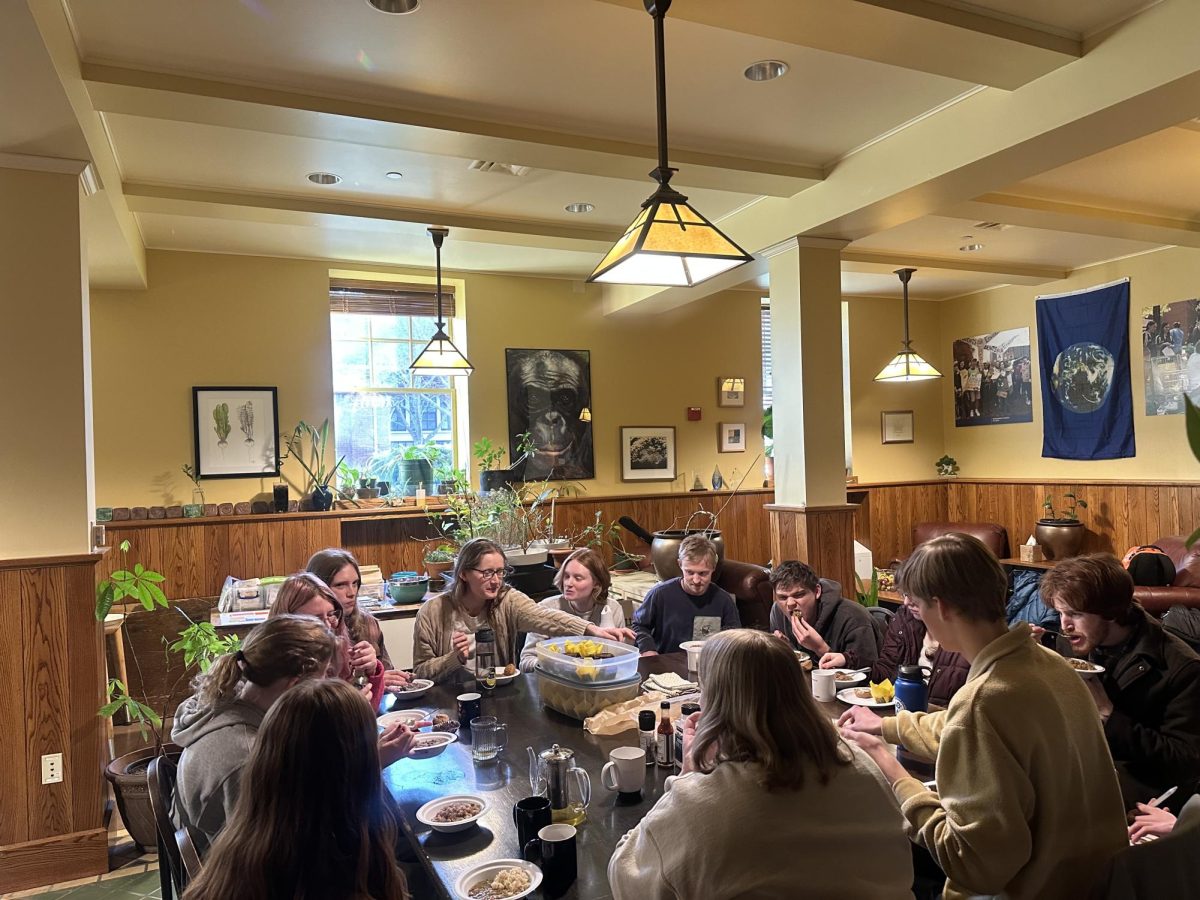Students are reporting food insecurity in the form of skipping meals, not finding balanced meals and eating less healthy meals, according to the results of an October 2023 survey distributed by Allegheny administration.
The survey, which is based on a widely-used USDA survey that examines food insecurity across campuses, consisted of 18 questions asking students about the quality, quantity and affordability of their food in the past 30 days.
Dean for the Student Experience Ian Binnington explained that the survey provided concrete evidence for ongoing student concerns.
“We wanted to get some baseline data,” Binnington said. “We’ll redo it every couple years and it’ll give us an indication of how we are along the path towards dealing with some of these issues.”
Food insecurity is defined as “the condition of not having access to sufficient food, or food of an adequate quality, to meet one’s basic needs,” according to the survey. The definition also notes that food insecurity “is not just about having enough food, but it also centers around the impact of what steps individuals will have to take to acquire that food as well.”
The topic of food insecurity became a campus-wide discussion last spring when Food Recovery Network, Allegheny Student Government and students raised concerns about the amount of food that could be purchased on the updated meal plans.
“I think it’s fair to say that the students last academic year were pretty centrally responsible for pushing this issue to the forefront,” Binnington said.
Approximately 9% of the student body, or around 100 students, responded to the survey. The data showed that Allegheny students experience food insecurity in two main ways: Lack of access to preferential nutrition and lack of education and knowledge about resources.
Wellness Case Manager Josh Guthrie, ’09, discussed the different facets of preferential nutrition and their barriers.
Along with concerns about health and nutrition, “there were comments around food sensitivity — so that’s making sure that there are allergen-free foods, gluten-free foods, etc.,” Guthrie said. “There were cultural, personal concerns around food — more vegan, more kosher-type lifestyle diets — and a lack of variety overall were the four main ways in which Allegheny College identified food insecure students here on campus.”
Of the 100 students reported in the survey data, 57 reported not being able to acquire the food they want on campus while 40 reported that it is either extremely or somewhat difficult to find food on campus. Out of 56 responses to the narrative portion of the survey, 49 students included one of the aforementioned concerns.
“It is possible to eat healthily on Allegheny’s campus for most students,” Binnington said. “Now there are allergy concerns, it’s certainly not possible for students to keep kosher or halal, I’m not going to pretend it is. That’s a conversation that we’re having with our food service provider. It’s more difficult if you’re vegan. It’s more difficult if you’re vegetarian. And so that certainly affects a lot of students.”
The data also indicated that price is a factor contributing to food insecurity: 20 students reported skipping meals, for any reason, in the last 30 days and 24 reported concern that their food would run out before they had money to buy more. 82 students reported skipping meals “at least some of the time,” the most common meal being breakfast.
Students skipping meals was one of the main concerns of the survey. Binnington explained that academics and physical health were both measures of the impact of food insecurity.
“Basically this survey kind of organizes itself around those two ideas: Is there an impact on a student’s academic progress and is there an impact on a student’s health?” Binnington said. “The good news is there’s little impact shown in this survey on a student’s academic progress. Most of the responses about academic progress are very, very limited. The bad news is that there’s a fair amount of effect on students’ health, particularly centered around the areas of access to healthy and nutritious food.”
When asked to rate how much they agree with the statement “I ate less healthy meals to eat more food,” 40 students identified as food insecure or reported “agree” or “strongly agree.” When asked to respond to the statement “I have experienced bodily weakness and/or other health symptoms because of limited food intake,” 30 students identified as food insecure. Binnington cited a lack of nutrition education and a lack of education about resources as possible contributing factors to food insecurity.
“One of the things that we’ve talked about with our local nutritionist is, are we actually teaching students how to eat a balanced and nutritious diet?” Binnington said. “What Josh and I have talked about is, some of this could be education, right? A student doesn’t think particular options are available but they don’t know where they are, or it could be actual changes that need to be made in the nutrition and welfare of the types of food that’s being served.”
Secretary of Food Recovery Network Sofia Hassan, ’25, said that there is not a lack of motivation when it comes to students seeking out food options, but rather that helpful resources are not always made apparent to students.
“In terms of the aspect that students don’t seek out help, I think that’s because help isn’t well advertised,” Hassan said. “For example, the Food Resource Center; it’s not included on tours, it’s not included on the building directory, so students aren’t aware of the resources at their disposal.”
The Center was implemented on the third floor of the Henderson Campus Center by the Food Recovery Network in September and has proven to be a popular resource for students given how quickly restocks of the space are depleted.
“What we do at FRN is we try to combat the issue of food insecurity by providing both meals when we can as well as cans of beans, oatmeal, things like that that students can grab that’s always free,” Hassan said. “There is definitely demonstrated need for this free food.”
Categories:
Survey offers data on food insecurity
Story continues below advertisement
0
More to Discover
About the Contributor

Sam Heilmann, Opinion Editor
Sam Heilmann is a sophomore from Johnstown, PA. She is majoring in Communications. This is her second year on the Campus staff, and her first as Opinion Editor. When she isn’t writing for The Campus, she enjoys painting, listening to music and spending time with her friends.







